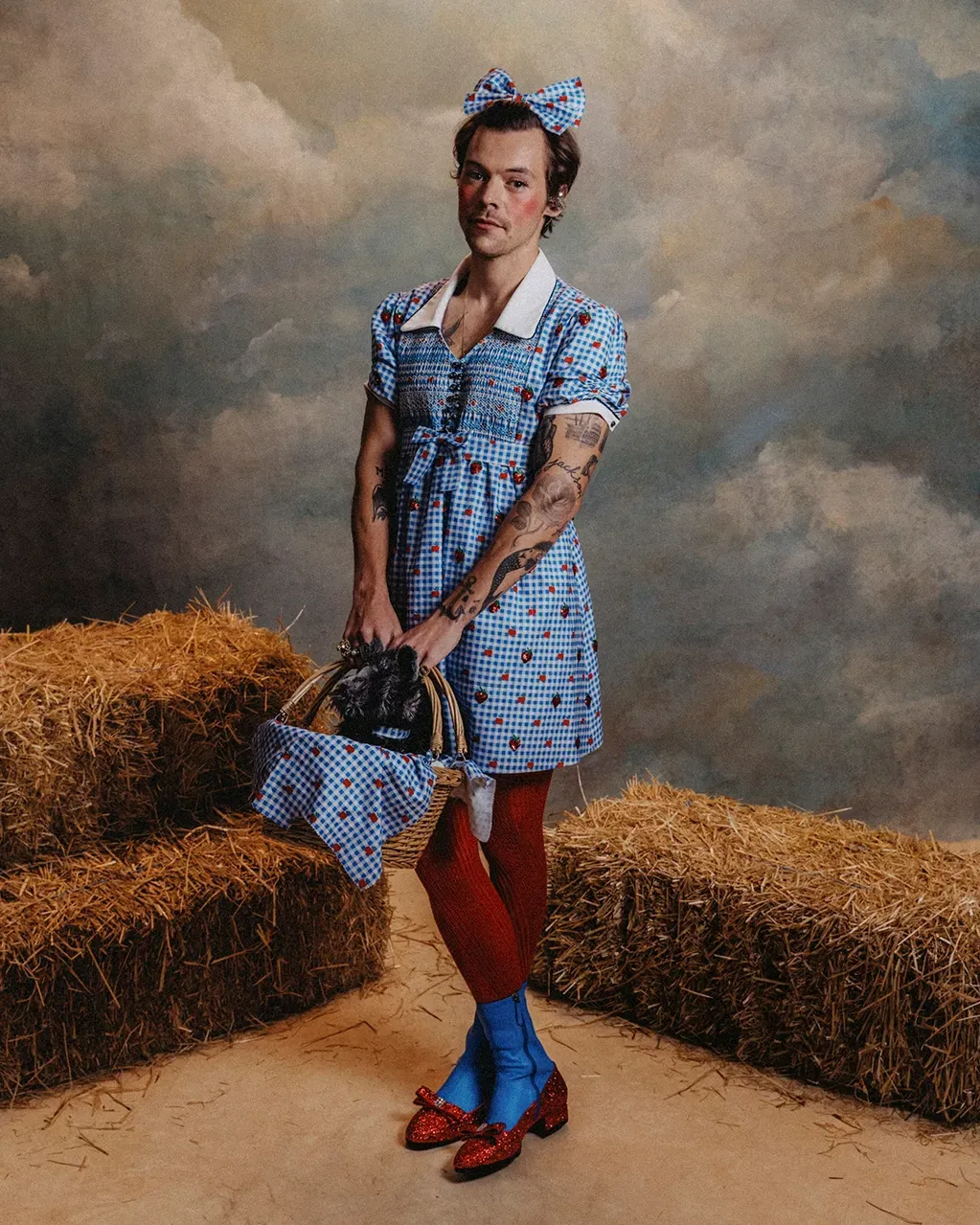Is Harry Styles Gay Or A Gay-Baiter?
Is he or isn’t he?
Is he one of us or is he playing one of us?
Is he gay, straight, bi, or WHAT?!
And why does it matter so much to us?
Personally, we feel Harry Styles’ ambiguous presentation of his sexual and gender identity is delish.
We like guessing.
Hoping.
And then not caring.
And then starting the cycle again.
As much as we love him and believe he has the right to express himself any way he wants, there ARE legit objections to what he’s doing. In this article we’ll explore those objections and see what they’re about.
For example, is he exploiting the LGBTQ+ community for personal gain without committing to a queer identity?
Does his use of queer symbols without explicitly claiming a queer identity send mixed messages to young, questioning fans, potentially undermining the importance of coming out and being open about one's identity?
We’ll tackle all these questions and more. Buckle up, buttercup!

What Exactly Is Queerbaiting?
Queerbaiting is the act of hinting at or teasing queerness without explicitly claiming it, often for the purpose of drawing in LGBTQ+ audiences without risking backlash from a homophobic or heteronormative mainstream audience. While this may seem harmless on the surface, the implications can be severe.
Firstly, queerbaiting perpetuates harmful stereotypes about LGBTQ+ people. By teasing at queerness without actually claiming it, queerbaiting reinforces the idea that being LGBTQ+ is something to be ashamed of or hidden.
This only serves to further stigmatize an already marginalized community.
Secondly, queerbaiting reinforces heteronormativity, the idea that heterosexuality is the only valid or natural sexual orientation. By refusing to claim a queer identity while using queer symbols or imagery, queerbaiters are essentially saying that being queer is not a legitimate or acceptable identity. This sends a harmful message to both LGBTQ+ people and the wider society.
Finally, queerbaiting undermines the validity of LGBTQ+ experiences. By co-opting symbols and imagery that are often deeply personal and meaningful to LGBTQ+ people, queerbaiters are essentially appropriating a culture and identity that they do not belong to. This can be incredibly frustrating and hurtful for LGBTQ+ people who have had to fight for recognition and acceptance of their identities.
In the case of Harry Styles, his use of queer symbolism and imagery without explicitly claiming a queer identity has led to accusations of queerbaiting. While some may argue that his intentions are harmless, the implications of queerbaiting can be severe, perpetuating harmful stereotypes, reinforcing heteronormativity, and undermining the validity of LGBTQ+ experiences.
Is Harry Styles Queerbaiting?
Let's dissect some of Harry Styles' actions and statements that have been accused of queerbaiting:
Rainbow flags and flowers: Styles has been known to incorporate rainbow flags, a symbol of LGBTQ+ pride, into his performances and fashion choices. Additionally, he often adorns himself with flowers, reminiscent of Oscar Wilde's signature style. Critics argue that these gestures pander to the LGBTQ+ community without making any explicit commitments to representation.
Ambiguous statements on sexuality: Styles has consistently declined to label his sexuality when questioned by the media. In an interview with Better Homes & Gardens, he stated, "I've been really open with it with my friends, but that's my personal experience; it's mine." Some argue that his reluctance to define his sexual orientation leaves fans guessing and perpetuates the queerbaiting narrative.
Queer-coded music videos and lyrics: Styles' music videos and lyrics have been known to feature queer-coded imagery and themes. For example, his song "Medicine" contains lyrics that suggest a same-sex encounter, but he has never explicitly confirmed the song's intended meaning. This type of ambiguity can be seen as queerbaiting, as it leaves fans to speculate about his intentions and identity.
Is Harry Being Progressive or Regressive?
On one hand, his refusal to label himself and his celebration of fluidity can be seen as a progressive stance, challenging societal norms and expectations around gender and sexuality.
However, the lack of clarity surrounding his identity can also be perceived as exploitative, taking advantage of the LGBTQ+ community's desire for representation without genuinely committing to it.
For queer fans like Michael, a 25-year-old gay man, Styles' ambiguity can be deeply troubling. Michael explains, "I've looked up to Harry for years, and his music has helped me through some tough times. But when I hear accusations of queerbaiting, it feels like a betrayal. It's like he's using our community for profit without truly understanding or respecting us."
The emotional impact on fans who identify with the LGBTQ+ community can be significant. Jamal, a young gay man, shares his experience: "When I first discovered Harry Styles, I felt seen and understood. But now, with all these accusations of queerbaiting, I feel disillusioned and used. I thought Harry was an ally, but it feels like he's just playing a game with our emotions."
Ambiguity in the context of queerbaiting is a double-edged sword. While it may challenge traditional norms and foster conversations about gender and sexuality, it can also be perceived as manipulative and harmful to the very community it appears to support. .
Do We Have The "Right" To Know Harry Style's Identity?
The public's right to know about a celebrity's personal identity is a contentious issue, with arguments both for and against the idea that celebrities have a responsibility to disclose details about their lives.
The right to privacy:
On one side of the debate, advocates for celebrities' right to privacy argue that personal identity is a deeply individual and subjective matter. They maintain that celebrities, like all individuals, should have the right to determine what aspects of their lives they wish to share with the public.
In the case of Harry Styles, this argument suggests that he is under no obligation to define or discuss his sexual orientation, as it is a personal matter that does not necessarily have any bearing on his work as an artist.
The role of representation:
On the other hand, proponents of the public's right to know argue that celebrities, by virtue of their public visibility and influence, have a responsibility to be transparent about their identities.
They contend that representation is essential for fostering understanding and acceptance of diverse identity groups, and that celebrities who choose to remain ambiguous about their identities may be perpetuating harmful stereotypes or contributing to a culture of secrecy and shame.
In Styles' case, this argument implies that he has a responsibility to his fans and the LGBTQ+ community to be open about his identity, regardless of his personal preferences or desires for privacy.

The impact on mental health:
The debate surrounding the public's right to know about a celebrity's personal identity also touches on issues of mental health and well-being. Constant speculation and pressure to disclose personal details can take a significant toll on a celebrity's mental health, as they may feel compelled to constantly defend or justify their choices. A
dvocates for privacy argue that respecting a celebrity's boundaries and allowing them to determine what they share about their identity is crucial for supporting their emotional well-being.
The power dynamics:
Another aspect of the debate centers on the power dynamics between celebrities, the media, and the public. Critics of the public's right to know argue that the demand for personal information about celebrities' identities can reinforce unhealthy power imbalances, with the media and public feeling entitled to pry into a celebrity's life without considering the consequences for the individual.
In Harry Styles' case, the ongoing speculation and debate about his sexual orientation can be seen as an example of this power dynamic at play.
If Harry's Gay, Why Doesn't He Just Come Out?
Fear of backlash:
One potential factor influencing Harry Styles' decision to remain ambiguous about his sexual orientation is the fear of backlash from fans, media, or the music industry.
While society has become more accepting of LGBTQ+ individuals in recent years, homophobia still persists, and coming out as queer can still have negative consequences for public figures.
Marketability and appeal:
Another possible reason for Harry Styles' reluctance to label his sexual identity could be concerns about marketability and broad appeal.
As a pop star, Styles' success relies in part on his ability to reach a wide audience. By maintaining ambiguity around his sexual orientation, Styles can appeal to a diverse fan base without alienating those who may be uncomfortable with or opposed to LGBTQ+ identities.
Privacy and personal boundaries:
A third factor that may contribute to Harry Styles' choices regarding his sexual identity is his desire for privacy and the preservation of personal boundaries.
As a public figure, Styles is already subjected to intense scrutiny and speculation about his personal life. By remaining ambiguous about his sexual orientation, he can maintain a semblance of control over his own narrative and protect his personal life from further intrusion.
The Cost of Not Coming Out
Reinforcing stigma and stereotypes:
When public figures like Harry Styles choose not to disclose their sexual orientation or remain ambiguous, they may inadvertently contribute to the perpetuation of stigma and stereotypes surrounding LGBTQ+ individuals.
By not taking a clear stand on their identity, these celebrities may unintentionally signal that there is something shameful or controversial about being openly queer.
Missed opportunities for representation and advocacy:
Public figures who stay in the closet may also miss out on opportunities to use their platform to advocate for LGBTQ+ rights and representation. B
y coming out and embracing their identity, celebrities can help normalize LGBTQ+ experiences and challenge societal biases. In the case of Harry Styles, his decision to remain ambiguous about his sexual orientation may limit his potential to serve as a role model and advocate for the LGBTQ+ community.
Impact on personal well-being:
The decision to stay in the closet can also have significant consequences for a public figure's mental and emotional well-being.
Living with the constant fear of exposure and the pressure to maintain a carefully constructed public image can be incredibly stressful, leading to feelings of isolation, anxiety, and depression.
Effect on relationships and trust:
Finally, remaining in the closet can have negative implications for a public figure's personal relationships. When one's identity is shrouded in secrecy, it can be difficult to form deep connections and trust with others, as friends and loved ones may be kept in the dark about a crucial aspect of the individual's life.

Queer Symbols Used by Harry Styles in His Performances and Public Appearances
Rainbow flags: Harry Styles has been known to wave and wear rainbow flags during his concerts, a symbol that is widely recognized as representing the LGBTQ+ community. The flag's colorful stripes stand for the diversity and unity of the community, making it a powerful emblem of queer pride and visibility.
Genderfluid fashion: Styles has become known for his genderfluid fashion choices, often blurring the lines between traditional male and female clothing. By wearing dresses, high heels, and makeup, he challenges conventional expectations of masculinity and embraces a more fluid expression of gender.
Androgynous hairstyles and accessories: Styles' hairstyle choices and accessories often lean towards androgyny, further emphasizing his disregard for strict gender norms. From pearl necklaces to painted nails, he incorporates elements traditionally associated with femininity into his personal style.
Song lyrics and themes: In his music, Harry Styles occasionally explores themes of love, desire, and identity that resonate with queer experiences. Some of his lyrics can be interpreted as alluding to same-sex relationships or challenging heteronormative expectations.
The Implications of Using Queer Symbols Without Claiming a Queer Identity
Appropriation and exploitation: One concern surrounding the use of queer symbols by public figures who do not explicitly claim a queer identity is the potential for appropriation and exploitation. By adopting queer aesthetics and symbols without acknowledging their historical and political significance, these individuals may be seen as capitalizing on LGBTQ+ culture without contributing to or supporting the community.
Misrepresentation and erasure: Another potential issue is the risk of misrepresenting or erasing the experiences of LGBTQ+ individuals by using queer symbols without context or understanding. When public figures like Harry Styles incorporate queer aesthetics into their performances and public appearances, they may inadvertently dilute the meaning and impact of these symbols, potentially leading to a loss of cultural and historical significance.
Authenticity and responsibility: The use of queer symbols by public figures who do not identify as LGBTQ+ raises questions about authenticity and responsibility. By embracing queer aesthetics, these individuals may be seen as taking on the mantle of queer representation without fully understanding or addressing the challenges faced by the LGBTQ+ community. This may result in a superficial or tokenistic approach to queer issues, undermining the potential for meaningful change and advocacy.
Despite the potential for ambiguity and confusion, the use of queer symbols by non-queer individuals can still have positive effects. For instance, it can help to increase visibility and awareness of queer issues and identities, and encourage greater acceptance and inclusivity. It can also serve as a means of solidarity and support for the LGBTQ+ community, demonstrating that one is an ally and advocate for the community, even if they do not identify as queer themselves.
However, the use of queer symbols without claiming a queer identity can also be seen as appropriative, exploitative, and even harmful.
It can be viewed as a form of "pinkwashing," or the exploitation of queer issues and identities for profit or image enhancement without meaningful action or advocacy to support the community.
It can also reinforce the idea that queer identities and experiences are only valuable or interesting when performed by non-queer individuals, perpetuating the marginalization and erasure of queer voices and perspectives.
Ultimately, the use of queer symbols by non-queer individuals is a complex and multifaceted issue, with both potential benefits and drawbacks. It is important to consider the context, intentions, and impact of such use, and to prioritize the voices and experiences of the LGBTQ+ community in discussions of queer symbolism and politics.
In the case of Harry Styles, his use of queer symbols and imagery has been met with both admiration and criticism. Some fans see it as evidence of his queerness and a celebration of LGBTQ+ identities, while others view it as queerbaiting and appropriation. Regardless of his intentions or personal identity, the implications and impact of his use of queer symbolism are significant and warrant critical examination and discussion.
The use of queer symbols by non-queer individuals is a complex and nuanced issue, with important implications for the LGBTQ+ community and its allies. While it can serve as a means of increasing visibility and support for the community, it can also perpetuate harmful stereotypes and reinforce systems of marginalization and erasure. It is important to approach this issue with sensitivity and awareness, and to prioritize the voices and perspectives of the LGBTQ+ community in discussions of queer symbolism and politics.










